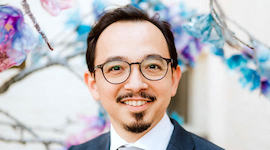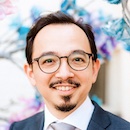Linguistics in 嘉義
A couple weeks ago I went to Chiayi (嘉義, pinyin: Jiāyì) to present a paper at the Linguistic Society of Taiwan’s National Conference on Linguistics.1 I got a chance to meet some wonderful and kind Taiwanese linguists, make friends with some linguistics students, as well as explore the city of Chiayi.
| Chiayi is a medium-sized city (270k people, so still way bigger that Luodong or Yilan) on the plains of southwestern Taiwan. The good news about getting to Chiayi is that there is a [[Taiwan High Speed Rail | high speed rail]] station—the bad news is that that station is actually about half an hour east of the city by car. I took a taxi into the city Thursday night, but took the free shuttle service on Sunday.2 As is the case with most cities on the west coast, it personally took me more time to go from Nanao to Taipei than to then take the high speed rail down to whatever city… such is life on the east coast: sans high speed rail. |
The conference itself was Friday and Saturday. This particular conference was limited to speakers who were current students or recent MA or PhD graduates, so many of the talks were exploratory and less developed. They were still a lot of fun for me to see, though, especially as many of them were on Mandarin or Taiwanese, so there was a lot of data and phenomena that I’d never even considered. It was also great to see professor Luther Liu, an eminent researcher of Chinese comparatives, whom I met in 2006 at the Chicago Workshop on Chinese Linguistics, as well as many other friendly professors. I my gave my talk on Saturday and received an award for my paper.
You can see Luther Liu and I talking in this first picture below… try to find us!3
<zp:taiwan/chiayi/chiayi1.jpg><zp:taiwan/chiayi/chiayi7.jpg><zp:taiwan/chiayi/chiayi8.jpg>
Each talk at the conference was followed by prepared constructive criticism by a “commentator” who’s a professor with similar research interests. As a corollary, while all the speakers at the conference were younger, a good number (30+) of professors from all around the island were in attendance as well. I believe this annual conference is an excellent opportunity for ling students in Taiwan to have their work known and criticized by professors outside of their own departments, and also to get to know others in their field. It fosters a sense of community among young researchers outside of their own schools—I’d love to see more such activities back in the US.4
| On Saturday evening after the conference I went out with some MA students from [[National Tsing Hua University | Tsinghua University]] (國立清華大學, or simply 清大). As one was originally from Chiayi and another went to school there, I was in good hands for finding the best local food. We first hit up a stand to get some 火雞肉飯 (turkey rice) which is a Chiayi delicacy… it’s so simple yet so delicious! |
<zp:taiwan/chiayi/chiayi2.jpg><zp:taiwan/chiayi/chiayi3.jpg><zp:taiwan/chiayi/chiayi4.jpg><zp:taiwan/chiayi/chiayi5.jpg>
Afterwards we walked around in their night market, eating some Finally, here’s a photo we took in front of the traffic circle which is a Chiayi landmark. Thanks for the good times!
<zp:taiwan/chiayi/chiayi6.jpg><zp:taiwan/chiayi/chiayi9.jpg>
Next up is the International Symposium on Chinese Languages and Linguistics (IsCLL) that I’ll be attending (but not presenting at) in a couple weeks, so I look forward to seeing some of my new linguist friends there again!
-
“The Verbal Nature of Mandarin Comparative bi”. Check out the paper or the handout. ↩
-
Every twenty minutes, from the back of Chiayi train station. ↩
-
Thanks to Claudia for most of the photos here! ↩
-
Chicago had a similar program, in the form of the “professionalism seminar” (which I took with Anastasia Giannakidou) and related “Graduate Student Mini-conference,” and I’m sure other schools in the US have similar opportunities for their MA and PhD students. The environment is different, however, as the field of formal linguistics is even smaller than in the US, so in some ways that community-building across programs is both more important and also easier to accomplish. ↩

